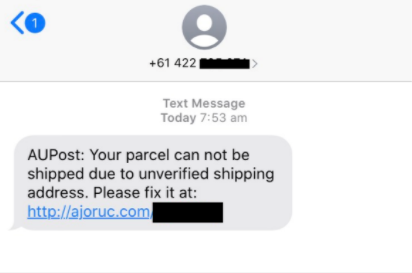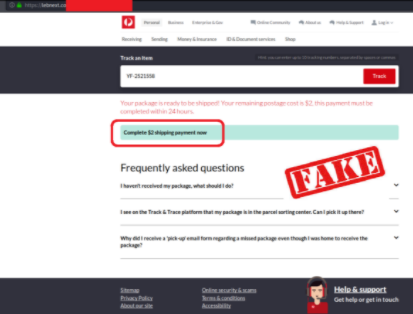Latest Scam Alert: Australia Post & PayPal
Published on September 28 2020
Scammers are constantly looking for ways to trick you into supplying your personal and financial information. We have recently discovered scams, specifically pretending to be from Australia Post and PayPal. Below we have demonstrated how you could better protect yourself and your loved ones from these scams.
Scams targeting Australia Post customers
You may receive a phone call or email from someone pretending to be from Australia Post. The caller or email informs that Australia Post has a refund for you and will ask for your credit card details to process the refund.
Should you receive one of these phone calls or emails, please do not hand out any personal information. It is a scam, please either hang up the call or delete the email immediately.
Another Australia Post scam that has been circulating during August involves false text messages informing you of a delivery notice and urging you to click on a link to confirm the address. The link will direct to a fake Australia Post website to get your personal and financial information.
Below is an example of the text message:

Below is an example of a fake Australia Post website:

We suggest you treat this text message the same way as you would approach any suspicious emails you receive if in doubt remove immediately. Please note that Australia Post will never email or text message you to request personal and financial information.
To learn more about scams targeting Australia Post customers, please visit Scam alerts on the Australia Post website.
Scams targeting PayPal customers
If you use PayPal, please be cautious with scam emails with a subject line such as Suspicious Activity on Your Account or Your account has been limited. These emails will inform that your account details have been altered and hence your account has been limited. Such emails will advise that you need to log in via a specific link to change your personal information. The email may try to force you into supplying your details by warning to lock your account if you do not update your details by a specific date.
Below is an example of the scam email

Need help?
If you believe someone has gained access to your personal details, even if the scam appears unrelated to your finances, you should contact your Bank immediately.
A prompt response can be crucial in providing you with the best chance to prevent any loss.
- If you have concerns about your Unity Bank account contact us on 1300 36 2000
- If you have been the victim of identity theft, IDCARE can guide you through the steps to reclaim your identity. Contact them on 1300 432 273 or via https://www.idcare.org
- You can find out how scams work, how to protect yourself, what to do if you’ve been scammed or report a scam to the Australian Competition and Consumer Commission (ACCC) via the Scamwatch website scamwatch.gov.au





